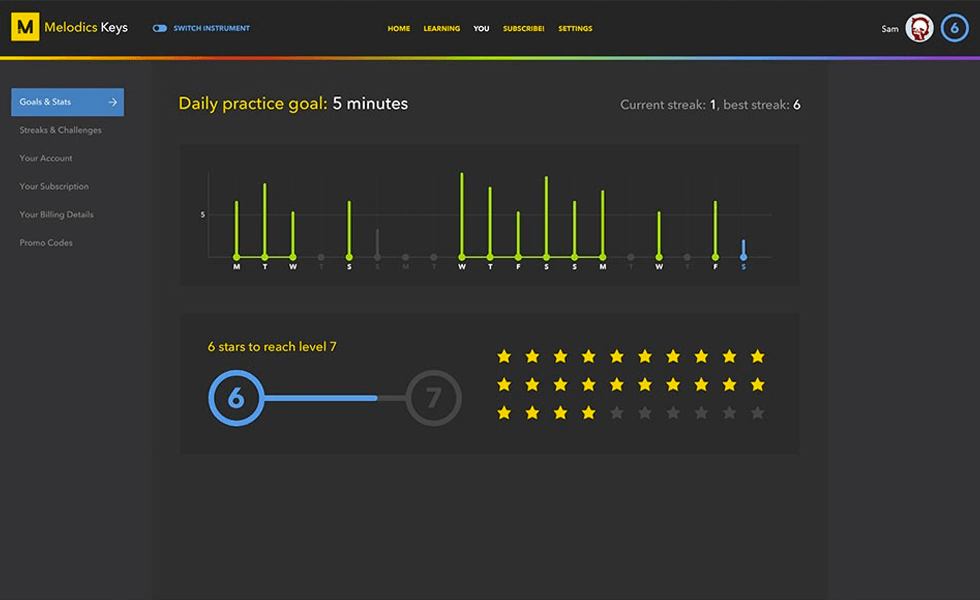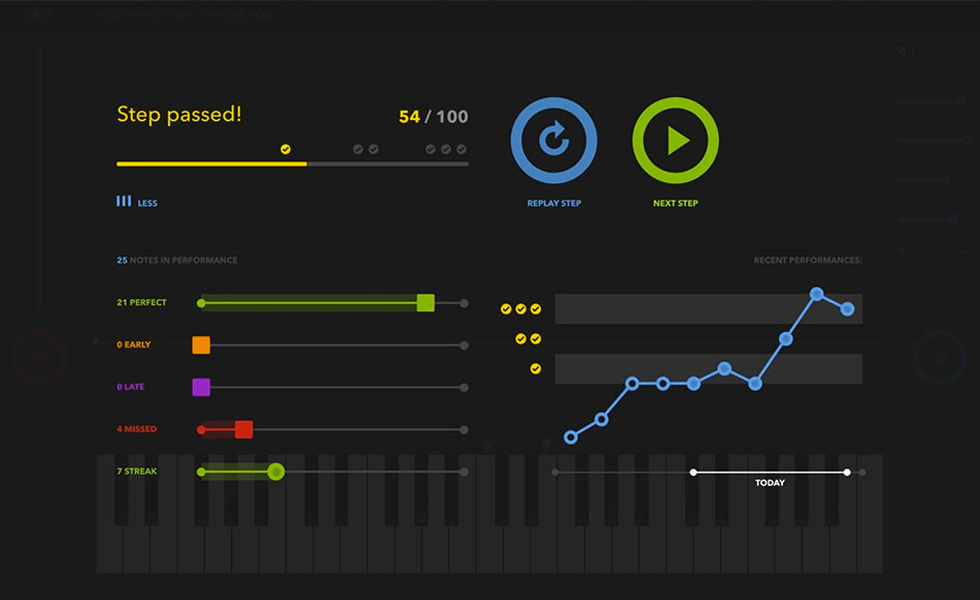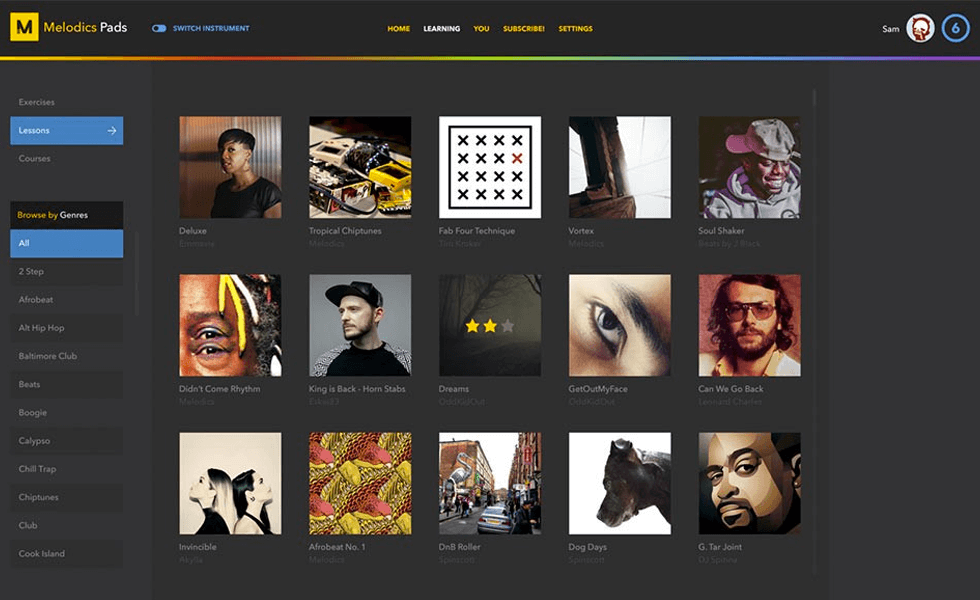Melodics: Your Personal Music Mentor
Learning Companion Tailors Practice To Your Ability & Musical Preference
Anyone lucky enough to have a formal musical education will recall hour-long, tutor-led sessions with a rigid format, barely tailored to your abilities or musical ambitions. Perhaps your experience was more inspirational and formative. But for years, learning an instrument generally involved doing the same thing as everyone else, learning in a certain way from the same teacher, and following a curriculum that was determined by an exam board who had no bearing on where you wanted to go, musically. While this is a tried-and-tested method of learning, and countless incredible musicians have been nurtured and developed this way, it is old-fashioned. Although modern tools have helped to augment these practices, there’s been few, if any, competitors to the rigid status quo of conventional music learning.
Until now, that is, thanks to Melodics, an interactive desktop app that aims to improve your musical abilities through tailored learning and customised practice, which adapts its content based on your playing ability, style and musical preferences.
Melodics creator and CEO Sam Gribben sets the scene: “Music education in general hasn’t really changed for centuries. The current state of the art is YouTube videos, and while YouTube is an amazing resource for learning to play instruments and learning to play music, it is really one-way. You’re watching someone else play and then trying to figure out how to do it yourself. Which is fundamentally how much has been taught for centuries.”
“If you practice, you will get better. If you don’t practice, you won’t get better. So far, no-one’s ever challenged us on that!” — Sam Gribben, Melodics
Melodics, on the other hand, has been designed by Gribben and his team as “software to help people practice”. The theory behind this is simple. “If you practice, you get better. If you don’t practice, you won’t get better. So far, no-one’s ever challenged us on that!”

Melodics is free to download and comes with 60 free lessons for keys, pad controllers and drums. The free version limits play to five minutes of performance per day, but monthly and annual pricing options allow for unlimited play time, over 1000 lessons, courses and exercises, new weekly content, and the ability to free-play over lessons. The first time you fire it up, you are asked to complete some questions about your musical aspirations and preferences. Melodics then tailors a set of lessons for you, and guides you through exercises with a slick user interface.
Behind the scenes of the software, there are three key parts to the Melodics experience, as Gribben explains. “The first is the immediate feedback that you get when you’re playing, which actually helps you to learn how to play a part. The second layer is all of the stuff that we do to help you get into the habit of practicing. You’re encouraged to practice, and you’re rewarded for doing five minutes a day. Our customers say that, once they’ve got into that habit, they start to progress really quickly, with just a small amount every day. The third area is making your practice more effective. So if you’re doing five minutes a day, how to make that five minutes much more useful than just doing five minutes of unguided practice. So that’s figuring out what people need to work on and being able to direct it. Part of that is being smart about when we tell people to go back and recreate the same thing they did months ago, so that they don’t lose it.”
Despite Melodics’ trend-bucking nature, it’s important to note that Gribben isn’t at war with conventional music educators — quite the opposite. “Melodics is not intending to replace a real teacher, and if you think of Melodics as a great way to practice, it’s a really good companion to conventional lessons. If you can get piano lessons or keys lessons from a real teacher, you totally should. You can get your daily practice in with Melodics, and you can talk to your teacher about which lessons within Melodics would be appropriate for you to get better. Each lesson is nicely tagged, so if you need to work on your finger independence or syncopation, or various other aspects of learning to play keys or pads, the teacher can help you focus on those areas.”


The Melodics team came to market with a pad-drumming learning tool, and in 2017 launched their Keys module, which aims to develop the real-world skills that a producer might need to add keys parts to their tracks. Gribben is quick to emphasise the difference between ‘piano’ and ‘keys’ — the former being a more formal, classical calling, the latter being more suited to modern music-making and being able to competently play keyboard-based instruments like synths and electric pianos in the studio production environment. “We’ve intentionally decided to go into keys and not piano,” says Gribben. “There’s a really big difference for us. There isn’t much out there for producers who want to learn keys. You can take piano lessons, and learn some Debussy and stuff, but then you have to figure out how to apply that to the world of a producer.”
This is an important distinction that gives Gribben and Melodics an advantage in music instrument education. “Traditionally, to be a keys player, you have to learn all the piano stuff and ditch most of it, because it’s not really relevant. Whereas what we’re doing is making courses that have things that you can apply immediately. So in the courses, there are things like techno basslines, and house chord progressions, and trap leads, not like… Mozart!”

Because Melodics is constantly learning from its users’ everyday habits, Sam and his team of developers are able to use the player’s habits (good and bad) to influence Melodics’ practice algorithms. “One of the things we have learned a lot about over the last few years is some of the science behind practice — because Melodics is fundamentally a ‘practice’ tool, rather than a ‘learning’ tool. Our research has helped to back up some established assumptions like ‘you should not practice mistakes; practicing with mistakes is bad because you reinforce those mistakes’. So we’ve got tools to help you take a section, break it up, loop it, slow it down, get it right, and then repeat it and build it up to full speed. You can really work on nailing the hard bits, then incorporate them into the wider piece, rather than just repeating your mistakes.”
“You are playing music that sounds like the kind of music you want to make.” — Sam Gribben, Melodics
But what Sam credits as one of the main attractions to Melodics is the musical content of the lessons. “You are playing music that sounds like the kind of music you want to make. We’ve got a wide range of genres — like keys lessons with Mark De Clive Lowe, pad drumming from DJ Jazzy Jeff and loads more from popular artists in a range of genres. You can get really hooked on it, and it feels like you’re playing a game, but you’re learning things that are immediately applicable to your own compositions.”
Novation have teamed up with Melodics to offer Novation Launchpad, Launchkey and Impulse customers additional free lessons on top of the selection that comes as standard when you use Melodics. All you need to do is register your Launchpad, Launchkey or Impulse, and download the promo code that unlocks 10 extra lessons. Melodics is free to download, and it comes with free lessons: 20 for pads, 20 for keys and 20 for drums. Check it out at www.melodics.com.
Words: Chris Mayes-Wright

